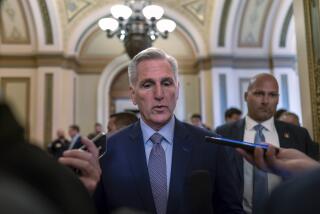Obama, Boehner hold one-on-one deficit talks
Congressional leaders will converge on the White House for Thursday’s summit on deficit reduction, but the burden for advancing the talks and averting a fiscal crisis increasingly has fallen on two key negotiators: President Obama and House Speaker John A. Boehner.
As a deadline nears, top aides for Obama and Boehner have privately been exchanging views about budget proposals, a sign of efforts underway to work through key issues that have separated the two sides for more than two months.
Meanwhile, Obama and Boehner have held a pair of secret meetings at the White House, sessions coming after their golf outing last month. Even key party leaders were unaware of the most recent meeting, which was held Sunday.
The president and House speaker, an Ohio Republican, are seeking a deal on cutting federal deficits to win congressional approval for an increase in the nation’s debt limit. Failure to increase the government’s borrowing limit by Aug. 2 could trigger a financial crisis, experts warn.
The White House wants a deal before that and favors a larger package of $4 trillion in spending cuts and new revenue, which budget hawks say is needed to begin to reduce the nation’s record deficits and debt.
Both the president and the House speaker have much to gain politically if they can forge a history-making agreement, motives not always shared by many lawmakers. Such a broad deal would require political pain on all sides, putting lawmakers up for reelection next year in difficult circumstances.
Boehner first met secretly with Obama at the White House two weeks ago, shortly after their June 18 golf outing. The White House has calculated that Boehner’s GOP-controlled House is where any deal must pass, as the Senate will rely primarily on votes from the Democratic majority to pass the debt ceiling increase.
The White House characterizes the talks with the GOP as “earnest,” despite outward displays of partisanship. On Wednesday, when Obama held a “Twitter Town Hall,” Boehner tweeted a question that challenged Obama’s record on job creation.
“There are some theatrics that obviously occur externally,” said David Plouffe, a senior advisor to Obama and manager of his 2008 campaign. “What we’re focused on is less the external theatrics than the progress that’s getting made privately.”
At the same time, the two sides remain far apart on the spending cuts and new tax revenue that would be needed for such a far-reaching deal.
Fiscal experts and most Democrats say budget cuts alone are inadequate to balance the government’s books. But Republicans have insisted that no new tax revenue be used for deficit reduction, repeatedly arguing that Washington has a “spending problem.”
Rep. Eric Cantor (R-Va.), the majority leader, said Wednesday that Republicans would consider proposals by Democrats to close tax loopholes for the wealthy, a comment interpreted as partial GOP concession. But Cantor hastened to add that Republicans didn’t want to see any net increase in funds to the government.
“If the president wants to talk loopholes, we’ll be glad to talk loopholes,” Cantor said. “But, listen, we are not for any proposal that increases taxes, and any type of discussion should be coupled with offsetting tax cuts somewhere else.”
Republicans would be willing to consider swapping tax loopholes for a payroll tax reduction that Democrats have sought to spur hiring, GOP aides said.
Loopholes cited by Democrats include tax breaks for executive aircraft, favorable business accounting treatment, ethanol credits and other measures.
But any deal on loopholes would pale in comparison to the amount of spending cuts the GOP is seeking in exchange for its vote to increase the U.S. borrowing limit.
Cantor outlined potentially “historic” budget reductions of $2.5 trillion over the next decade, an amount the GOP has said would be the minimum necessary for a comparable increase in the nation’s borrowing capacity through 2012.
Democrats have complained that such drastic cuts would be damaging, and pressed Wednesday for “shared sacrifice,” meaning new revenue. Obama has proposed capping tax deductions for upper-income Americans, a measure rejected by the GOP.
“Republicans would rather protect millionaires and billionaires,” Sen. Sherrod Brown (D-Ohio) said at a Democratic news conference.
Underscoring the difficulty of striking a deal, one House Republican, Rep. Paul Broun of Georgia, introduced legislation Wednesday to lower the debt ceiling, which would require even deeper cuts to pay off already accrued debt.
More to Read
Sign up for Essential California
The most important California stories and recommendations in your inbox every morning.
You may occasionally receive promotional content from the Los Angeles Times.












